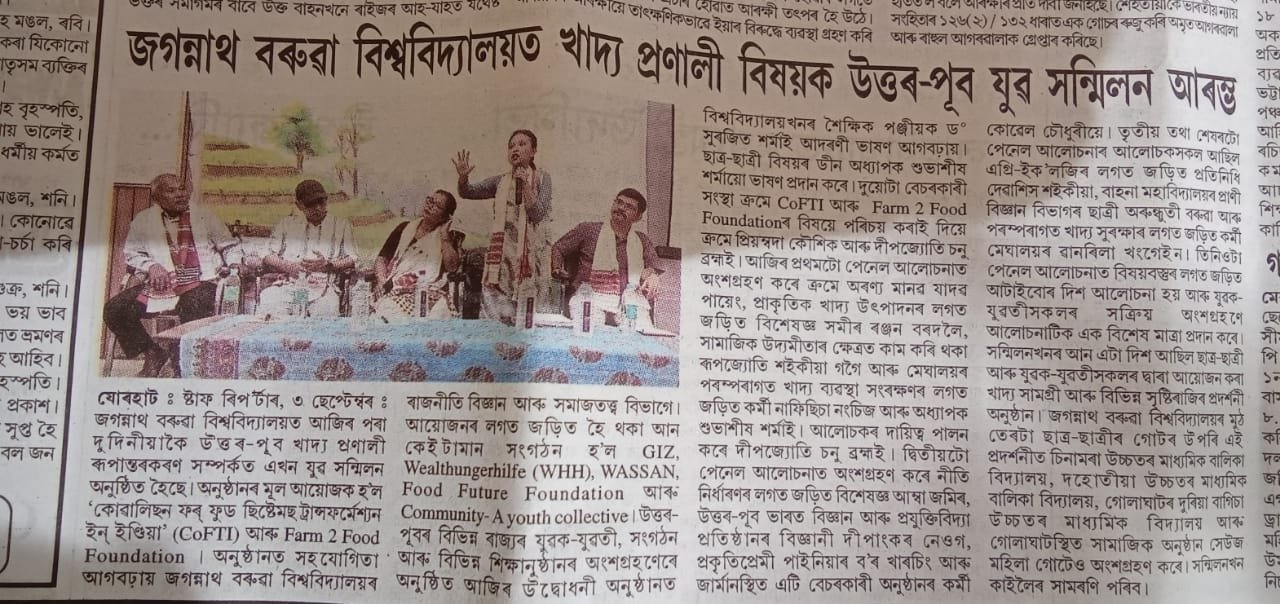A two-day youth conclave on “North East Youth Alliance for Indigenous Food System Transformation” was successfully held on 3rd and 4th September 2025 at Jagannath Barooah University, Jorhat. The program was organised by the Coalition for Food Systems Transformation in India (CoFTI) and Farm2Food Foundation, in collaboration with the Department of Political Science and the Department of Sociology, Jagannath Barooah University. The event was supported by GIZ, Welthungerhilfe (WHH), WASSAN, Food Future Foundation, and Community – A Youth Collective.
Day 1: Inaugural and Knowledge Sharing
The conclave commenced with the ceremonial lighting of the lamp by Dr. Surajit Sarma, Academic Registrar of the University. He underlined the importance of youth leadership in sustainable food transformation. Mr. Subhasish Sharma, Dean of Students Affairs, also addressed the gathering, stressing the integration of indigenous knowledge into education and policymaking. Ms. Priyamvada Kowshik introduced CoFTI, and Mr. Deep Jyoti Sonu Brahma presented the work of Farm2Food Foundation.
A major highlight of Day 1 was the Youth-led Exhibition Programme, which attracted wide attention. Exhibits included indigenous food items, handicrafts, ornaments, paper-based products, pickles, and ‘kesuhar’. The exhibition saw participation from 13 student groups of Jagannath Barooah University (8 from Political Science and 5 from Sociology), 3 school groups—Cinnamara Girls’ HS School, Dohotia Girls’ HS School, and Dooria Bagan HS School, Golaghat—and 1 women’s SHG, Seuj Women Group from Merapani, Golaghat.
Panel Discussion I: Rooted in the North East
This session featured eminent voices from the region: Padmashree Awardee Jadav Payeng, the “Forest Man of India”, Samir Ranjan Bordoloi, natural farming and agroecology pioneer, Rupjyoti Saikia Gogoi, social entrepreneur, Naphishisha Nongsiej, NESFAS field associate, and Mr. Subhasish Sharma, Dean of Students Affairs. The discussion highlighted indigenous practices, ecological diversity, and cultural heritage as guiding forces for food system resilience.
Panel Discussion II: Solving the Food System Puzzle with North East Ecosystem Experts
The second panel linked policy, science, and grassroots efforts. The panelists were Amba Jamir, policy and development strategist, Mr. Dipankar Neog, Principal Scientist, CSIR-NEIST, Pyniarbor Kharshing, sustainable development practitioner, and Koel Chowdhary, Terre des Hommes, Germany. The experts stressed the need for cross-sectoral collaboration to ensure climate-resilient and inclusive food systems.
Youth-Led Panel: Youth in Dialogue
The concluding session of Day 1 provided a platform for youth voices. Debasish Saikia, promoting indigenous farming practices, Arundhuti Boruah, a Zoology student at Bahona College, and Wanrila Khongngain, community facilitator and entrepreneur, shared their experiences. A synthesis session followed, facilitating meaningful exchanges between experts and youth, reinforcing the need for intergenerational partnerships in shaping sustainable food systems.
Day 2: The Way Forward – Collaborative Planning for Next Steps
The second day of the conclave marked a historic milestone with the launch of a Youth Alliance comprising multiple Youth Councils to strengthen indigenous food systems and advance food system transformation across the Northeast. Anchored by young participants from Meghalaya, Nagaland, and Assam, the alliance emerged directly from group-work sessions and presentations held on 4th September at J.B. University.
The day was designed around a comprehensive food systems mapping exercise, where participants identified unique regional food systems, analyzed challenges such as climate change, seed loss, policy gaps, and declining youth engagement, and explored opportunities including NGO-led innovations, entrepreneurship, and youth fellowships. These insights led to the formulation of scalable youth-led action points—such as capacity-building programs, seed banks, mentorship circles, market assistance, and policy engagement.
An interactive dialogue followed between youth participants and distinguished experts—Amba Jamir, Policy Analyst (NIHE), Koel Chowdhury (Terre des Hommes, Germany), Deep Jyoti Sonu Brahma (Farm2Food Foundation), and Priyamvada Kowshik (CoFTI). Their feedback bridged theory and practice, enabling participants to refine their strategies with professional guidance.
The most significant outcome of Day 2 was the formation of the Youth Alliance for Indigenous Food System Transformation, symbolizing the collective leadership of the region’s youth in shaping sustainable, resilient, and community-driven food futures.
Conclusion
The two-day conclave successfully combined academic discussions, exhibitions, cultural expressions, action labs, and youth-led collaborations, creating a vibrant platform for cross-learning. The formation of the Youth Alliance stood out as a landmark achievement, setting the stage for long-term partnerships and transformative action.
The conclave concluded with a resounding call to recognize the youth of Northeast India as critical architects of India’s sustainable food future, reaffirming Jagannath Barooah University’s commitment to empowering youth, fostering academic partnerships, and promoting inclusive development.
The two day programme was anchored jointly by Ms. Dimpi Dutta and Ms. Tapasya Das of Jagannath Barooah University, who seamlessly guided the proceedings and ensured the active engagement of participants.
( Report prepared by SS Regan on behalf of the Jagannath Barooah University)




